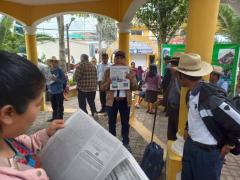Thank you to Vice.com for this news article.
Image courtesy of Vice World News
BOGOTÁ, Colombia - An 11-year-old Colombian boy has received messages threatening to “skin him” and “to cut his fingers off” after posting a video on social media calling on the government to provide more access for children in Colombia to online schooling amid the pandemic.
The attack on Francisco Vera has sparked outrage among human rights groups, the government and Colombian citizens alike.
This is the latest and one of the most shocking threats towards environmental defenders, who for years now have been killed and faced threats for their work in the Andean nation.
“I was the one who noticed the message because I check all of Francisco's social networks. He had already received a lot of ridicule, criticism and insults for his activism in defense of life and the environment, but he had never been threatened with death,” Vera’s mother, Ana María Manzanares, told a local newspaper.
"Today something unacceptable happened in Colombian society which was threats, via social media, against an 11-year-old boy who protects the environment. This is obviously something we firmly condemn," President Iván Duque said in a Tweet.
“I can’t wait to skin this son of a bitch. I want to hear him scream while I cut off his fingers, to see if he keeps talking about environmentalism and dignity,” said the tweet, published on January 16 by the now-suspended account of @BelboCodazzi.
Francia Marquez, an internationally acclaimed Colombian environmental activist who has had several attempts made against her life, told VICE News that “it is extremely saddening” that this happened to a young child who is educating Colombian society on the need for environmental change.
“It’s evidence of the amount of violence we environmental activists face in this country. The threat that Francisco had to deal with at the weekend shows why Colombia is first place in Latin America, and the world, with the most environmental activists killed… it's an attack against the hope of those who fight for a better country... a better planet,” Marquez said.
Global Witness, a British non-profit that tracks violence against environmental defenders around the world, ranked Colombia as the worst country in the world for violence against climate activists, with 64 such murders in 2020. Human rights organizations thought that COVID-19 lockdowns would help reduce attacks, but the opposite happened: criminals took advantage of mobility restrictions to kill activists, even in their own homes.
“Rather than defending and guaranteeing their sustained economic future, the lack of employment opportunities for all has people aggressively attacking an 11-year-old against their own interests,” said Gimena Sanchez of the Washington Office on Latin America (WOLA). Polarized politics has convinced some Colombians that defending their natural resources - the country's biggest asset - is somehow going against economic development, she added.
“Sadly, this is what happens when the economic and political elite doesn't defend the lives of social leaders and value environmental sustainability. Things degrade to the point that a child is receiving death threats.”
Vera, from the town of Villeta, about 100 kilometers from Colombia’s capital city Bogotá, has around 200,000 followers on social media and has been compared to Swedish activist Greta Thunberg, a world-famous defender of environmental causes since she was 15 years old. Vera became known after an intervention in the Colombian Congress at the end of 2019, asking legislators to prioritize the care of the country's natural resources.
"These threats should help put a spotlight into the serious risks faced by environmental leaders, particularly in remote regions of Colombia,” Juan Pappier, senior americas researcher for Human Rights Watch, said.
“I am glad Colombian authorities have condemned these threats, but these crimes generally go unpunished and efforts to ensure protection of activists at risk are woefully insufficient. Much more is needed to ensure that environmental leaders can play their indispensable role."

